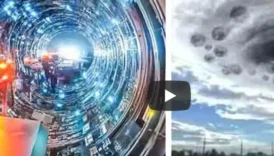The Simpsons Prophecies: Are They Just Coincidences or Actual Future Predictions?

For over three decades, The Simpsons has reigned as one of the longest-running and most celebrated television series in history. With 36 seasons and counting, this iconic show has entertained millions of viewers with its razor-sharp satire and comedic take on contemporary society. Yet behind this seemingly harmless cartoon lies a series of “prophecies” so striking that they’ve spurred endless debate on the internet. From predicting Donald Trump’s presidency to the discovery of the Higgs boson (often dubbed the “God particle”), and even pointing to the events of September 11, The Simpsons has captured the attention of conspiracy theorists, casual fans, and academics alike.
- The Simpsons Prophecies: Are They Just Coincidences or Actual Future Predictions?
- 1. Humanity’s Age-Old Fascination with Prophecy
- 2. From Ancient Oracles to Modern Satire
- 3. The Simpsons Prophecies: The Most Notable Examples
- Donald Trump Becomes President
- The White Tiger Attack in a Circus Act
- NSA Surveillance
- Disney’s Acquisition of Fox
- The 9/11 Magazine Cover
- The Higgs Boson Formula
- 4. Conspiracy Theories: Masons, Time Travel, and Government Propaganda
- 5. The Secret of the Writing Team: Fusing Science and Art
- Notable Writer Examples
- 6. How Do These Predictions Happen? Logical Explanations
- 6.1. Donald Trump Example Revisited
- 6.2. NSA Surveillance Example Revisited
- 6.3. Higgs Boson Example Revisited
- 7. Other Pop Culture “Prophets”
- Isaac Asimov and Arthur C. Clarke
- 8. The Fine Line Between Sci-Fi and Reality
- 9. Conclusion: Coincidence, Scientific Foresight, and a Dash of Entertainment
- Don’t Forget Critical Thinking
- Are The Simpsons Unique?
- Final Thoughts
- Additional Resources & Recommended Readings
- A Note on Perspective
Is this all just a series of bizarre coincidences? Or is The Simpsons far more than a simple TV cartoon? In this American version of our deep-dive, we’ll explore the most-talked-about examples of the so-called “Simpsons predictions,” examine the backgrounds of the show’s highly educated writing staff, and consider whether these predictions are better explained through logic, science, and some keen social commentary rather than genuine clairvoyance.
So, strap in for a journey that promises to uncover the truth behind The Simpsons phenomenon, from internet lore to how large-scale conspiracies sometimes get woven into popular culture.
1. Humanity’s Age-Old Fascination with Prophecy
From ancient times, people have been captivated by the idea of peering into the future. Whether it was the Oracle of Delphi in ancient Greece, Nostradamus in 16th-century France, or Edgar Cayce in more modern times, individuals claiming to see what’s coming next have always been magnets for public intrigue. Some of these seers made predictions that seemed uncannily accurate, while others missed the mark by a wide margin.
As humanity advanced into the 20th and 21st centuries, the quest for prophecy didn’t fade. Instead, it transformed along with new communication channels—radio, television, and most importantly, the internet. What used to be the domain of mystical oracles is now sometimes expressed through discussions on Reddit, YouTube, and various social media platforms.
In that sense, it’s not entirely surprising that an animated show like The Simpsons—originally launched in 1989—could come to be viewed as a modern “prophet.” Unlike your typical soothsayer, however, The Simpsons doesn’t claim to foresee the future. Instead, it plays with current social, political, and cultural events, weaving them into comedic storylines that often come dangerously close to real-life happenings years later.
Reference:
– Clark, R. T. (2002). Myths of Prophecy Through the Ages. Cambridge University Press.
2. From Ancient Oracles to Modern Satire
When we talk about prophecy, images of shadowy figures chanting cryptic phrases in ancient temples come to mind. But prophecy has taken on a new cloak in the modern era. Now, “predictions” often surface in pop culture, fueled by the rapid spread of information online. The lines between pure chance, careful societal commentary, and actual prediction have become more blurred.
The Simpsons stands as a prime example. Countless posts across social media claim the show foretold everything from Trump’s presidency to global crises. Some share genuine frames from the show. Others use doctored images or references without proper context. The result: a huge online sensation that’s half comedic lore, half serious speculation.
- People once revered Nostradamus’ quatrains for seemingly predicting major events (World War II, the Great Fire of London, etc.).
- Today, The Simpsons memes float around, with fans or conspiracists pointing to still frames, lines of dialogue, or entire episode plots that seem to mirror reality.
What sets The Simpsons apart is that, unlike the cryptic verse of Nostradamus, it’s meant to be comedic. The show’s predictions are often revealed in a humorous or absurd context. Yet that doesn’t stop believers from looking for deeper meaning. It’s a fascinating commentary on our modern society, which loves both cynicism and wonder.
Reference:
– BBC Culture (2013). How Prophecy Turned into Popular Culture.
3. The Simpsons Prophecies: The Most Notable Examples
Over the years, The Simpsons has racked up a surprising list of so-called “predictions” that later made headlines. Some are minor details, while others are strikingly accurate glimpses into future events. Let’s look at the most frequently cited examples—and see how plausible they are as genuine prophecies versus brilliant comedic guesses.
Donald Trump Becomes President
One of the most talked-about predictions aired on March 19, 2000, in an episode titled “Bart to the Future” (or sometimes credited as referencing “Lisa’s future” scenario). In this storyline, Lisa Simpson is President of the United States, succeeding a certain Donald Trump. At the time, Trump’s presidency was an almost laughable premise—he was known primarily as a billionaire real estate mogul and a reality TV personality.
Yet on November 8, 2016, Trump was indeed elected the 45th President of the United States. This caused social media to explode with references to The Simpsons being clairvoyant.
But how did this come about? In fact, Trump had been toying with the idea of running for president as early as the late 1980s, mentioning his ambitions on talk shows such as The Oprah Winfrey Show. He even had various public interviews throughout the 1990s where he expressed potential interest in political office. So, while it may have seemed like a long shot, it wasn’t entirely out of left field.
References:
– The New York Times (2015). A Look Back at Trump’s Presidential Hints.
– Winfrey, O. (1988). The Oprah Winfrey Show – Donald Trump Interview.
The White Tiger Attack in a Circus Act
Another high-profile “prediction” appeared in a 1993 episode (Season 5, Episode 10) featuring a stage show where a white tiger attacks its performer. Around a decade later, famous Las Vegas magician Roy Horn of the duo Siegfried & Roy was mauled by a white tiger during a performance in 2003.
Were The Simpsons writers foretelling the future?
Probably not. Given that working with wild animals—especially big cats—always carries inherent risks, it wasn’t exactly unimaginable that a performer could be attacked. Even so, the parallel remains uncanny enough to intrigue fans.
References:
– Los Angeles Times (2003). Roy Horn Injured in Tiger Attack.
– American Journal of Performing Arts Safety (2004). Big Cats in Entertainment.
NSA Surveillance
In The Simpsons Movie (2007), there’s a scene depicting the National Security Agency (NSA) as eavesdropping on virtually everyone. Fast-forward to 2013, and former NSA contractor Edward Snowden stunned the world by revealing the extent of the government’s digital surveillance activities.
The immediate takeaway was that The Simpsons “knew” about the NSA’s operations. But in reality, widespread surveillance programs had been rumored and partially reported for years, especially post-9/11. The Echelon Project, an intelligence-gathering system developed during the Cold War, had been a topic of speculation in the press. The Simpsons simply transformed these hush-hush rumors into comedic fodder before the mainstream audience fully grasped the real situation.
References:
– Greenwald, G. (2014). No Place to Hide: Edward Snowden, the NSA, and the U.S. Surveillance State.
– Bamford, J. (1983). The Puzzle Palace: Inside the National Security Agency.
Disney’s Acquisition of Fox
In the 1998 episode titled “When You Dish Upon a Star”, there’s a quick gag implying that media giant Fox is in fact part of Walt Disney. While this was purely satirical at the time, it proved strangely prophetic when, in 2017, Disney purchased a significant portion of 21st Century Fox.
Between Disney’s acquisitions of Marvel, Lucasfilm, and Pixar, the writing was on the wall that the company was aggressively expanding. A Disney-Fox merger might have seemed unlikely in the late 1990s, but two decades later, corporate consolidations in the media space made it all too plausible.
References:
– The Guardian (2017). Disney’s $52.4bn Purchase of Fox Explained.
– Variety (2017). Inside the Disney-Fox Deal.
The 9/11 Magazine Cover
Perhaps the eeriest “prediction” is found in the 1997 episode, “The City of New York vs. Homer Simpson.” In one scene, Lisa Simpson holds up a magazine with a large “$9” cover price right next to the silhouette of the Twin Towers, forming an apparent “9/11.” This episode aired five years before the September 11, 2001 attacks on the World Trade Center.
Viewers and conspiracy theorists alike latched onto this as proof that The Simpsons was sending a coded message about 9/11. The show’s writers, including Josh Weinstein, have repeatedly stated this was an unintentional coincidence—a piece of graphic design that no one involved took as a forewarning. Even so, the chilling alignment of the numbers remains a staple of “Simpsons prophecy” discussions online.
References:
– Weinstein, J. (2016). Twitter Q&A About Simpsons Episodes.
– The New Yorker (2001). Cultural Coincidences Post-9/11.
The Higgs Boson Formula
This is the big one for science buffs: In a 1998 episode titled “The Wizard of Evergreen Terrace,” Homer Simpson scribbles an extremely complicated equation on a chalkboard during a home experiment scene. Years later, in 2012, physicists at CERN (near Geneva, Switzerland) announced the discovery of the Higgs boson, colloquially known as the “God particle.” Astoundingly, Homer’s equation was uncannily close to the predicted mass of the Higgs boson—even though the official verification occurred 14 years after the episode’s release.
The truth? The Simpsons has had numerous writers with strong academic backgrounds in math and physics. David Cohen, for instance, has degrees in both physics (from Harvard) and computer science (from Berkeley). He and another physics consultant formulated the chalkboard equation largely as a joke. The approximate closeness to the real Higgs boson mass was a result of their theoretical knowledge. The fact that it eventually matched real data so closely was at least partially serendipitous—though undeniably impressive.
References:
– The Guardian (2015). How Homer Simpson Predicted the Higgs Boson.
– Nature (2012). CERN’s Announcement of the Higgs Boson Discovery.
4. Conspiracy Theories: Masons, Time Travel, and Government Propaganda
Because The Simpsons has “predicted” so many major world events, it’s fertile ground for conspiracy theorists. Online forums like Reddit and 4chan have birthed theories that the show’s producers are high-level Freemasons, time travelers, or even government proxies. Some folks argue that the show reveals real future events coded into comedic storylines, possibly as a form of propaganda or mass conditioning.
Common Theories Include:
- The creators and writers of The Simpsons are part of an elite secret society with insider knowledge of global affairs.
- The show is used by government agencies to subtly prepare the public for future events.
- There is evidence of time travel, as the show depicts events so accurately it’s impossible to be coincidence.
Of course, there’s no credible evidence for any of these claims. Most revolve around taking comedic scenes out of context or merging them with other conspiracy narratives. It’s a testament to how social media can amplify unproven hypotheses and turn them into viral sensations.
References:
– Barkun, M. (2006). A Culture of Conspiracy: Apocalyptic Visions in Contemporary America. University of California Press.
5. The Secret of the Writing Team: Fusing Science and Art
Most TV writing teams have anywhere from 5 to 20 people. But over the lifespan of The Simpsons, at least 155 writers have contributed. Many hold degrees from prestigious universities like Harvard, Princeton, Berkeley, and others. Fields of study range from mathematics and physics to chemistry, literature, and even computer science.
Notable Writer Examples
- Al Jean: Graduated from Harvard in mathematics.
- Mike Reiss: Holds an English literature degree from Harvard.
- David Cohen: Physicist from Harvard, later completed a master’s in computer science at Berkeley.
- Jeff Westbrook: Earned a PhD in computer science at Princeton, plus a mathematics background at Harvard.
Given this impressive roster, the show’s comedic genius is blended with advanced knowledge of physics, mathematics, social theory, and current events. Writers consult real experts, incorporate ongoing scientific or sociopolitical issues, and then spin them into comedic gold. If you put a bunch of brilliant minds in a room, hand them up-to-date research and trends, they’re bound to craft scenarios that sometimes reflect the future more accurately than expected.
References:
– Ortved, J. (2009). The Simpsons: An Uncensored, Unauthorized History.
– CNN Interviews (various dates). Simpsons Writers Discuss Their Academic Backgrounds.
6. How Do These Predictions Happen? Logical Explanations
So, how do we account for The Simpsons apparently seeing the future? Here are some sensible explanations:
- A Large Number of Jokes and Scenarios
Over 36 seasons and 700+ episodes, The Simpsons has made thousands of gags referencing news, politics, technology, and more. Statistically, a handful of these comedic bits might end up aligning with real-world developments—especially over decades. - Expert Writers with Specializations
The show’s writing team includes mathematicians, scientists, economists, and others who stay on top of scientific literature and global trends. Their well-informed speculation can transform into “predictions” if the events do happen. - Cultural and Technological Awareness
Comics, TV shows, and sci-fi have often introduced concepts (like tablets, smartwatches, or advanced A.I.) long before they became mainstream. Keeping an eye on emerging technology often means you can guess the direction society might take. - Overinterpretation and Misrepresentation
Some “predictions” widely shared on social media are actually hoaxes or photoshopped images. Others might conflate unrelated scenes to fit a narrative. It’s important to verify the actual episodes before leaping to conclusions.
6.1. Donald Trump Example Revisited
Trump’s cameo as President in a 2000 episode was less a mystical prophecy and more a comedic projection based on his widely publicized ambitions. The joke hinged on the idea that an eccentric billionaire might one day occupy the White House—less improbable than it seemed to casual viewers.
6.2. NSA Surveillance Example Revisited
The Simpsons Movie joked about mass surveillance in 2007, but the seeds of modern digital spying go back decades to Echelon. Writers who follow global news would have known about the potential for large-scale eavesdropping, well before Edward Snowden officially blew the whistle.
6.3. Higgs Boson Example Revisited
Physicists had long theorized the existence of the Higgs boson. Various mathematical models proposed different mass ranges, some of which were close to what was eventually confirmed at CERN. The show’s staff math experts turned those references into a comedic chalkboard formula, which ended up incredibly close to the final real-world figure.
References:
– The Washington Post (2013). Echelon and the Origins of Modern Surveillance.
– Scientific American (2012). The Quest for the Higgs Boson: A Historical Outline.
7. Other Pop Culture “Prophets”
The Simpsons isn’t the only pop culture phenomenon credited with seeing the future. Consider Star Trek, which debuted in the late 1960s. This show featured handheld communicators (very similar to cell phones), tablets, voice-activated computers, and even theoretical faster-than-light travel. Over time, many of these “far-fetched” devices or ideas became reality—or at least served as an inspiration for real scientists.
Isaac Asimov and Arthur C. Clarke
Renowned science fiction authors like Isaac Asimov and Arthur C. Clarke also “predicted” technological advances in robotics, artificial intelligence, and space exploration. Asimov’s “Three Laws of Robotics” are still quoted by modern AI ethicists. Clarke envisioned satellite communications before they became ubiquitous.
In each case, the “prediction” label is partly a testament to how imaginative creators, with robust scientific literacy, can anticipate future breakthroughs. It’s not necessarily clairvoyance—just intelligent projection.
References:
– Star Trek Archives (1967). Production Notes on Technology Depiction.
– White, H. (2013). Warp Field Mechanics 101, NASA Institute for Advanced Concepts.
– Asimov, I. (1950). I, Robot. Gnome Press.
8. The Fine Line Between Sci-Fi and Reality
Literature and cinema often pave the way for scientific and societal evolution. Jules Verne’s 19th-century novels described submarines, helicopters, and journeys to the Moon, well before these were technologically feasible. Over a century later, we take many of these inventions for granted.
Likewise, The Simpsons frequently dabbles in possible future scenarios, from advanced AI to bizarre political outcomes. When these comedic or satirical premises happen to line up with real-life events, we find ourselves labeling them as “predictions.”
In many ways, science follows science fiction. Researchers have admitted to being inspired by on-screen devices and authors’ futuristic visions. It’s not unusual that a satirical cartoon with an extremely well-educated staff might similarly shape or predict cultural and scientific developments.
References:
– Verne, J. (1870). Twenty Thousand Leagues Under the Sea.
– Freedman, C. (2000). Critical Theory and Science Fiction. Wesleyan University Press.
9. Conclusion: Coincidence, Scientific Foresight, and a Dash of Entertainment
When it comes to The Simpsons “prophecies,” the reality is likely a blend of:
- Coincidences: With thousands of jokes and storylines produced over decades, some inevitably line up with real events.
- Scientific or Analytical Foresight: A writing staff fluent in physics, mathematics, economics, and literature can construct plausible future scenarios.
- Entertainment Value: The primary goal is still to make people laugh through satire, parody, and social commentary.
Don’t Forget Critical Thinking
The internet is rife with rumors and doctored images that exaggerate or fabricate certain “predictions.” For instance, the famous image of Trump descending an escalator supposedly featured in The Simpsons before it happened in real life was actually animated or edited after it became news. Such examples underscore the importance of verifying sources and not taking every “Simpsons prophecy” at face value.
Are The Simpsons Unique?
Plenty of other shows and books have made surprisingly accurate guesses about the future. A single writer like Asimov or Clarke can rack up multiple correct “predictions,” so it’s not shocking that over 155 academically accomplished writers on The Simpsons might produce 30 or so hits among thousands of comedic bits.
In essence, The Simpsons is not necessarily unique—it’s just extremely prolific, widely watched, and known for weaving in references to current and emerging technologies, political figures, and world events. It stands at the intersection of popular culture and intellectual depth, making it the perfect candidate for these sorts of claims.
Final Thoughts
So, does The Simpsons truly foresee the future, or is it simply reading the tea leaves of present-day trends with comedic flair? The best answer is probably that it’s very good at anticipating possible developments—especially when you have dozens of highly educated writers brainstorming possible scenarios and jokes. Over time, some of those playful jabs inevitably come to pass.
For those intrigued by the subject, many of the show’s key creatives have participated in interviews, podcasts, and DVD commentaries explaining the writing process in detail. They emphasize thorough research, collaboration with experts, and a desire to keep the humor as insightful as possible.
As fascinating as it is to think about a cartoon “predicting” major world events, it’s equally compelling to realize that intelligence, analysis, and creativity can sometimes echo what’s actually coming. In the fast-paced world of technology, politics, and cultural shifts, the line between “imaginative guess” and “prophecy” can be surprisingly thin.
Additional Resources & Recommended Readings
- Clark, R. T. (2002). Myths of Prophecy Through the Ages. Cambridge University Press.
- BBC Culture (2013). How Prophecy Turned into Popular Culture.
- Bamford, J. (1983). The Puzzle Palace: Inside the National Security Agency. Penguin Books.
- Greenwald, G. (2014). No Place to Hide: Edward Snowden, the NSA, and the U.S. Surveillance State.
- Ortved, J. (2009). The Simpsons: An Uncensored, Unauthorized History.
- The Guardian (2015). How Homer Simpson Predicted the Higgs Boson.
- Nature (2012). CERN’s Announcement of the Higgs Boson Discovery.
- Barkun, M. (2006). A Culture of Conspiracy: Apocalyptic Visions in Contemporary America. University of California Press.
- Asimov, I. (1950). I, Robot. Gnome Press.
- Verne, J. (1870). Twenty Thousand Leagues Under the Sea.
- Freedman, C. (2000). Critical Theory and Science Fiction. Wesleyan University Press.
A Note on Perspective
Ultimately, the The Simpsons remains a comedic masterpiece, not a crystal ball. If it occasionally brushes close to actual events, it’s usually through a combination of good research, playful science fiction, and a bit of luck. But that’s precisely why we keep watching—it’s entertaining and, at times, weirdly enlightening. Whether you’re a skeptic or a believer, perhaps the true “prediction” is that The Simpsons will keep surprising us for years to come.
Thank you for reading, and remember: staying curious, questioning what you see on the internet, and digging deeper into the facts can be just as fun as believing in a grand conspiracy. After all, that’s the spirit that keeps The Simpsons relevant in a world that changes faster than we can say, “D’oh!”





